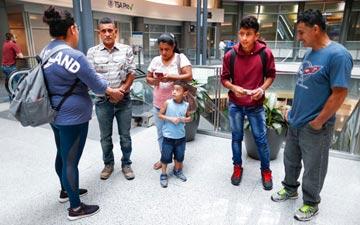
(AP Photo/John Minchillo)
As children we learn that when we do something wrong we apologize and we try to make it better. We say we’re sorry, we return Howard’s Silly Putty, and we try to do better next time.
After forcibly separating 2,654 migrant children from their parents at our southern border, we need to apologize and try much harder to make it better.
In June, U.S. District Judge Dana Sabraw ordered the Trump Administration to reunite the more than 2,000 families separated under a policy meant to thwart illegal immigration. According to a federal filing on August 16, 565 children remain separated from their parents and in federal custody.
“For every parent who is not located, there will be a permanently orphaned child,” said Sabraw, who oversees the reunification process, earlier this month. “That is 100 percent the responsibility of the administration.”
Dr. Colleen Kraft, the President of the American Academy of Pediatrics (AAP), who knows a thing or two about children, has said that what has happened to these children is nothing less than child abuse.
“These children have been traumatized on their trip up to the border, and the first thing that happens is we take away the one constant in their life that helps them buffer all these horrible experiences”—including leaving home and family, traveling by foot or in an airless crate, being apprehended. “That’s child abuse.”
Such separation causes toxic stress, disrupting brain architecture, halting language development, tearing social and emotional bonds. It also causes ethical stress—undermining the care and trust so necessary to good childhood development, to becoming compassionate, caring, and kind. Children do best and learn best in a community while being cared for by parents who know and love them.
As children, we learn to say we’re sorry; as a country, we should do the same. But we must do more than apologize; we also need to quickly make it better for the 500 plus children who remain in federal custody. We should step up, acting as good parents ourselves, and insist that this child abuse cease—that parents are located and reunited with their children at our expense. This is a crisis of our own making—we say we’re sorry, we return these children to those who love them; we vow to do better and to be better.
The AAP reminds us that children do not migrate, they flee danger and violence, clinging to their parents. These families deserve our apology and our assistance.
Related Coverage
"Family Reunification" by Margaret R. McLean, Irina Raicu, and Yael Kidron
